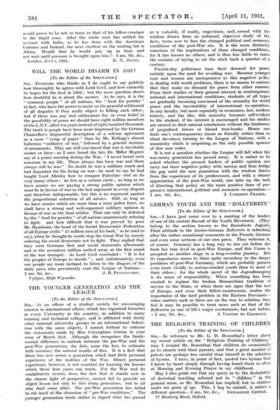WILL THE WORLD DISARM IN 1932?
[To the Editor of the SPECTATOR.] SIR,—Everyone who thinks as I do ought to say publicly how thoroughly he agrees with Lord Cecil, and how earnestly he hopes for the best in 1932 ; but the mere question shows how doubtful he is about the answer. As he says, it is the " common people " of all nations, the " food for powder " in fact, who have the power to insist on the peaceful settlement of all disputes if they really object to killing each other ; but if there was any real enthusiasm for, or even belief in the possibility of peace we should have eight million members of the L.N.U. after ten years instead of eight hundred thousand. The truth is people have been more impressed by the German Chancellor's disgraceful description of a solemn agreement as a mere " scrap of paper " than by Mr. Kellogg's almost ludicrous "outlawry of war," followed by a general increase of armaments. They are still convinced that war is inevitable sooner or later—as I once heard the late Dr. Miller Meguire say at a peace meeting during the War, " I never heard such nonsense in my life. There always has been war and there always will be war." No doubt he was a military coach and had depended for his living on war—he used to say he had taught Lord Allenby how to conquer Palestine—but so do very many others : we live in a vicious circle ; as long as we have armies we are paying a strong public opinion which must be in favour of war as the last argument in every dispute and therefore indispensable, but this is no argument against the proportional reduction of all armies. Still, as long as we have armies which are more than a mere police force, we shall have a strong and well-organized military opinion in favour of war as the final arbiter. That can only be defeated by the " food for powder " of all nations unanimously refusing to fight; and how difficult that is was proved by poor Mr. Hyndman, the head of the Social Democratic Federation of all Europe (with " 17 million men at his back," as he used to say), when he thought he could stop the Great War by merely ordering his social democrats not to fight. They replied that they were Germans first and social democrats afterwards and so the seventeen million melted away at the first sound of the war trumpet. As Lord Cecil concluded : " It is for the peoples of Europe to decide " ; and, unfortunately, even our people are more inclined to listen to the Jingoes of the daily press who persistently crab the League of Nations.—










































 Previous page
Previous page